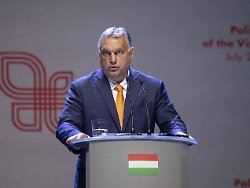Tuesday, May 18, 2021
Foreign ministers meeting
Hungary blocks EU position on the Middle East
In the face of violence between Palestinian militants and Israel, the EU cannot agree on a joint statement. Only 26 of the 27 member states vote in favor of a paper from Foreign Affairs Representative Borrell – Hungary refuses.
The foreign ministers of the EU countries have not been able to agree on a joint declaration on the escalation of the conflict between Israelis and Palestinians. As the EU Foreign Affairs Representative Josep Borrell announced after a video conference with the ministers, Hungary blocked an EU position he had proposed. Only 26 of the 27 member states supported the demand for an “immediate halt to all violence” and the “implementation of a ceasefire”.
Hungary’s Foreign Minister Peter Szijjarto accused the EU of opposing Israel. He said he “has a problem with these European declarations in general.” They are usually “very one-sided” and “do not help – especially not in these circumstances when there is such high tension”.
The Hungarian Prime Minister Viktor Orban has a strictly loyal position to the Israeli government and personally to Prime Minister Benjamin Netanyahu. EU diplomats therefore assumed that Hungary did not want to support calls to Israel to end the violence. Borrell had wanted to say on behalf of all 27 states, among other things, that the high number of civilians killed – including women and children – was unacceptable.
Condemnation of the Hamas attacks
According to Borrell, the other 26 member states also criticized the high number of civilian casualties in the conflict. Accordingly, they condemned the rocket attacks by radical Islamic Hamas and “fully” support Israel’s right to defend itself. But this must be done “in a proportionate manner” and in accordance with international law, said the Spaniard. There was also “strong support” for the demand on Israel to dispense with further forced rooms in Palestinian apartments in East Jerusalem, which triggered the recent escalation.
Hungary repeatedly causes trouble with vetoes in EU politics. For weeks, the country with close ties to China has also blocked a joint EU declaration on the human rights situation in Hong Kong. At the end of last year, Poland and Poland threatened to veto the € 750 billion Corona aid fund for weeks because the payment of EU funds is now linked to compliance with the rule of law.
Liberal MEP Guy Verhofstadt criticized the EU’s inability to act. “Again and again and again unanimity makes it impossible to defend Europe’s interests and values,” said the former Belgian head of government on Twitter. He called for the unanimity problem in areas such as foreign policy to be resolved in the EU reform debate that has now started. It should lead to concrete results by the spring of next year.
.
